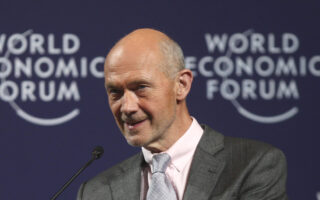Europe should brace for Ukraine impact on trade, expert advises

Governments need to avoid “export restrictions wherever possible” and should also try to “ease bottlenecks in trade by lowering tariff and non-tariff barriers to trade,” Victor Stolzenburg, a research economist with the Economic Research and Statistics Division (ERSD) of the World Trade Organization, tells Kathimerini.
The editor of the recent WTO Secretariat note “The Crisis in Ukraine: Implications of the war for global trade and development” also sounds the alarm about the economic dimensions of Russia’s invasion of the Eastern European country, noting that the WTO has already revised downward its estimate for global trade by 1.7% for 2022 and views a 30% rise in wheat prices as possible.
He also sees Russia suffering losses of more than 5% of its gross domestic product as a result of sanctions, noting that Europe is its key trading partner.
And as for speculation regarding the end of globalization, Stolzenburg dismisses it as “unwarranted.”
 What have been the consequences of the Ukraine crisis on global trade and what is the baseline scenario its 2022 performance?
What have been the consequences of the Ukraine crisis on global trade and what is the baseline scenario its 2022 performance?
We believe that the crisis, together with the continued impact of the Covid-19 pandemic, will have a substantial negative impact on merchandise trade growth. Therefore, we have downgraded our projection from the previous forecast from October 2021 of 4.7% to 3.0%. But these figures may be subject to revision due to uncertainty about the course of the conflict in Ukraine and our simulations include scenarios that would essentially halve trade growth relative to the baseline 4.7% at purchasing power parity.
What role does Russia play in world trade and what have the consequences of the Ukraine crisis been on Russian trade so far?
While the shares of Russia and Ukraine in world trade and output are relatively small, they are important suppliers of essential products, notably food and energy. Both countries accounted for 2.5% in world merchandise trade and 1.9% in world GDP in 2021. Yet they supplied around 25% of wheat, 15% of barley and 45% of sunflower products exports in 2019. Russia alone accounted for 9.4% of world trade in fuels, including a 20% share in natural gas exports.
Regarding the impact on Russian trade so far, hard data is missing given Russia’s central bank’s suspension of publishing monthly trade data. While several countries report an uptick in trade with Russia, notably China and India, Europe is by far the biggest import destination for Russian exports, which is why we foresee Russia’s exports declining considerably. Similarly, the sanctions will depress imports. Our simulations project that Russian GDP could fall by as much as 5.3% with the impact on trade likely greater as the sanctions have increased international trade costs more than domestic trade costs.
Which regions/sectors are most affected by the implications of this crisis?
The countries closest to the conflict parties, that is the Commonwealth of Independent States and Europe, will be most affected but for certain goods, other regions will feel the brunt of the crisis. As mentioned, Russia and Ukraine are major exporters of food and energy and, in particular, certain African and Middle Eastern countries depend heavily on grain imports from the region. In total, 35 countries in Africa import food and 22 import fertilizer from Ukraine, Russia or both. To provide examples, Egypt imported 74% of its wheat from the conflict region, Benin 100% and Lebanon 86%. Other countries are more dependent on imports of fuels from Russia, such as Finland (63%) and Turkey (35%).
‘While shares of Russia and Ukraine in world trade and output are relatively small, they are important suppliers of essential products, notably food and energy’
In addition to the agricultural and energy sectors, Russia and Ukraine also provide certain key inputs to industrial value chains. Russia accounts for 4.6% of global iron and steel exports. Ukraine is responsible for 2.2% of steel shipments globally, but they are more dominant in some markets (46% in Latvia, 43% in Senegal, 32% in Egypt). Other examples include metals (palladium, rhodium) or chemical gases (neon, krypton) used in the automotive and semiconductor industries. Russia is the largest producer of palladium, supplying 26% of global import demand in 2019, with higher shares in the United States (43%), Japan (45%) and the Republic of Korea (38%). Other automobile producing countries are also exposed, including China (29%) and Germany (26%). Russia is also a key producer of rhodium, meeting 7% of global demand with high shares for Italy (34%), the Republic of Korea (23%) and Switzerland (20%). Ukraine supplies more than 90% of US semiconductor-grade neon, critical for lasers used in chipmaking. The gas, a byproduct of Russian steel manufacturing, is purified in Ukraine.
What is the WTO assessment as far as the course of energy prices and the food crisis are concerned?
There are many unknowns regarding how the situation will play out. Past experiences have shown that food and energy price surges can lead to a spiral of export restrictions triggering a self-defeating dynamic in which each country loses, but so far the evidence for such a dynamic have been limited. Our simulations for wheat prices project that prices could increase globally by more than 30%, with some regions, such as sub-Saharan Africa or the Middle East and North Africa, facing increases above 50% if countries restrict exports.
How do the implications of the Ukraine crisis affect the predictions for growth in 2022?
We project that the crisis and related policies could lower global GDP growth by 0.7-1.3 percentage points, bringing growth to somewhere between 2.8% and 3.7%, depending on the baseline forecast.
What can governments do to protect trade in this crisis?
As I indicated earlier, countries should avoid export restrictions wherever possible. Any measures that are taken despite this should be introduced in a transparent and temporary manner.
Apart from this, countries should try to ease bottlenecks in trade by lowering tariff and non-tariff barriers to trade.
How are the pre-existing complications in supply chains evolving? Has the pandemic ceased to affect global trade?
The pandemic continues to put a strain on global trade, in particular in the form of lockdowns in China. In addition, we have identified four interrelated major trends affecting global trade already prior to the pandemic for another publication. These are (i) the erosion of wage differentials due to growing incomes in developing and emerging countries, (ii) technological progress including robotization, (iii) geopolitical tensions causing changes in the trade policy environment, and (iv) structural changes in the world economy shifting demand towards services. While the pandemic has slowed down the shift towards services in favor of trade growth, it has triggered more interventions in trade policy and more investments in technology, which could both slow trade growth.
Some are now worried about the future of globalization. What is your opinion?
The war and the pandemic have caused firms to update their risk assessments. We believe that this might lead to a certain degree to a reorganization of supply chains and trade more widely. However, broader fears about the end of globalization seem unwarranted as the evidence for reshoring is limited and anecdotal evidence points rather to increased diversification and higher inventories. Firms have invested tremendous amounts in their international production networks, and, in particular for skilled activities, these investments are difficult and very costly to reverse. At the same time, resources and skills are often not available domestically, so that reshoring is not feasible from a technical perspective either.





